David Crane
If nothing else, this has been a good time for catch-up. Theodor Fontane’s Effi Briest (translated by Walter Wallich, Persephone Books, £13) was a treat. But the real discovery of the year was an author I had never heard of, Wallace Breem. He seems to have spent his life as a librarian in the Inner Temple but found time to write three historical novels, one of which, The Leopard and the Cliff (Faber Finds, £13), set during the Third Afghan War of 1919, is up there with the very best novels of military life: vivid, tense and deeply moving, with a central character who has a touch of Guy Crouchback about him.
For those of us who never got to the exhibition, Forgotten Masters: Indian Painting for the East India Companyedited by William Dalrymple (The Wallace Collection, £18.75) is a wonderful reminder of what we missed.
Graham Robb
The adventurous realism of Anna Keen’s Turneresque drawings of a dissolving monumental city in London: The Metamorphosis(Unicorn, £25), with an essay by Edward Lucie-Smith and the artist’s own contemplative commentary, reminded me of the multimedia paintings of Victor Hugo, another admirer of ‘the Black Babylon’.
Don DeLillo’s frighteningly funny The Silence (Picador, £11.99) begins with a crash landing. The novel was virtually finished when the pandemic struck and screen time became more important than ever. In The Silence, the screens have all gone blank. Some vast digital malfunction has occurred:
‘The pauses were turning into silences and beginning to feel like the wrong kind of normal,’ Martin said. ‘Are we living in a makeshift reality?… A future that isn’t supposed to take form just yet?’
DeLillo’s 17th novel celebrates the muted hysteria of intelligent human beings in the face of universal calamity.
Hilary Spurling
My favourite book is On Chapel Sands by Laura Cumming (Chatto, £16.99). Published last year, it is part mystery, part memoir, part hymn to the majestic expanses of the author’s native Lincolnshire. Cumming starts by unravelling the secrets and lies that constrained her mother’s childhood in a web devised by Laura’s grandfather, a man as bleak as the flatlands he came from. But what begins as a furious indictment turns into a subtle, searching portrait against a backdrop of land, sea and sky, evoked with the ravishing delicacy and warmth of a Dutch landscape painting.
The other book that haunts me is Catrine Clay’s The Good Germans: Resisting the Nazis 1933-45 (Weidenfeld & Nicolson, £20), a brilliant and deeply disturbing account of six individuals, ranging from Prussian aristocrat to law student to factory hand, who risked, and in some cases lost, their lives to oppose Hitler.
Susan Hill
Inside Story by Martin Amis (Cape, £20). Like all great writers, Amis has produced one or two absolute bummers; but then he comes up with another work of genius to remind us that he is the best. This is one. It’s faction — real people are woven into his credo, his philosophy of life, whatever. Kingsley and Jane, several wives, girlfriends and children are all here; but his best friend Christopher Hitchens, the Hitch, takes centre stage, larger than life even in death. Amis writes better than anyone. What a book!
Long Live Latin by Nicola Gardini (Profile Books, £14.99). A love letter to the finest language ever created. I loved Latin at the age of 11 and I still do, though I’m not good at it. Gardini explains lucidly, compellingly and passionately how and why it is so elegant, beautiful, expressive and succinct. Go seek out your Aeneidparallel text and remind yourself.
Dangerous Ages by Rose Macaulay (British Library, £9.99).The BL’s women writers series is as good a thing as its crime classics: out-of-print titles worth bringing back. None more so than this intelligent, tender novel about the women in one family — grandmother, mother, daughters, granddaughters and their complex relationships. Men do appear, but they barely count. Macaulay can conjure up a beach at night, a drawing room at teatime, a tedious pre-war train journey to Rome, a woman’s mood, temper, frustration. She knows about families, about yearning, the fear of old age, the follies of youth and above all about love. Better than most new novels I’ve read for years.
Ruth Scurr
Every new book by Kate Summerscale is a cause for celebration, but The Haunting of Alma Fielding(Bloomsbury, £18.99) is her best since The Suspicions of Mr Whicher. She found the research papers of the Hungarian émigré ghost-hunter Nandor Fodor in the library of the Society for Psychical Research in Cambridge. That day even her taxi driver turned out to be a psychic medium, with an invisible amphisbaena (two-headed snake) around his neck for protection and healing. Summerscale follows Fodor’s investigation of the case of Alma Fielding, a young housewife at the centre of a supernatural storm in 1938. As always, she is a calm and riveting guide to traumatic historical events.
In Dutch Light(Picador, £25), Hugh Aldersey-Williams reclaims the 17th-century polymath Christiaan Huygens from relative obscurity in an excellent biography that is also a story about the birth of modern science. Among other things, Huygens invented the mechanism for the pendulum clock and discovered the rings of Saturn through a telescope he had invented.
Marcus Berkmann
The two books I have enjoyed most this year I am actually reading at the moment. Miles Kington’s My Mother, the Bearded Lady (Unbound, £25) is a selection of the great humourist’s letters which, among other things, has answered a question that has been bugging me all these years: how did he manage to write so much? Because he couldn’t help it is the simple answer. For, as well as bashing out five columns a week for the Independent, and latterly a stunningly good monthly column for the Oldie, Kington was also writing long, discursive, extremely funny letters to friends, acquaintances and virtual strangers alike for most of his life. The depth of his creative energy was astonishing. This is the autobiography he never wrote, at least intentionally, and I also think it’s his best book.
Mark Haddon’s The Pier Falls (Vintage, £9.99) is a short story collection that came out in 2016, but I originally ignored it as I had been underwhelmed by the slightly dull novels he wrote after The Curious Incident of the Dog in the Night-Time. Wrong again, Berkmann. These are mesmerisingly good stories, hugely varied, skilfully written, full of deft touches and narrative shocks you weren’t expecting, even after you had got used to the tone and so had come to expect a shock of some kind. It’s an absolute treat — and I am now reading only one story every two days to eke it out for as long as possible.
Mark Amory
I do not choose to read many new books now, but Olive, Again by Elizabeth Strout (Viking, £14.99) led me to read with unfailing pleasure the other six books she has written about connected characters who live in Crosby, a small town on the coast of Maine. They wander from story to story, some meeting, some not, most of them surprising you. My favourite, The Burgess Boys, deals with two brothers who left but cannot quite escape. But you should read them all,preferably in order.
Our Man in New York by Henry Hemming (Quercus, £20) is about Bill Stephenson and his struggle to get America into the second world war after June 1940. The British — including Ian Fleming — are bold, imaginative and successful; also ruthless and particularly fond of fake news, not to mention forgery. President Roosevelt is so sympathetic that he could have been impeached. As exciting as any thriller.
Jane Ridley
The best royal book by miles was Anne Glenconner’s Lady in Waiting (Hodder & Stoughton, £20). The memoirs of retired ladies-in-waiting in their eighties might be expected to be bland, discreet and snobbish. This is funny, gossipy and riveting. The author was lady-in-waiting for 30 years to Princess Margaret, who emerges from this account as remarkably sympathetic. Glenconner’s life was scarred by tragedy — two of her sons died, and the third was nearly killed in a motorbike accident. Her husband, Colin Tennant, was half crazy. Despite all this, she is extraordinarily lacking in self-pity and never loses her sense of humour.
Andrew Motion
Don’t be put off by the title. Postcolonial Love Poem by Natalie Diaz (Faber, £10.99) is much subtler than it sounds: a collection of lyrics which speak to recent and historical Native American experience with great richness of language and profundity of mind. ‘I have a name,’ Diaz says, ‘yet no one who will say it not roughly.’ As this implies, her work is a kind of confession, but also an assertion; a record of wounding and grief, but also of resilience and wonderment. And it amounts to the best book of poems I’ve read this year from either side of the Atlantic.
Richard Ingrams
Many of us, myself included, firmly believed that when Conrad Black was sent to the slammer in 2011, his wife, who had had three husbands previously, would give him the heave-ho. We were wrong. Barbara Amiel, now nearly 80, has stayed devotedly at his side, describing him in her 600-page book Friends and Enemies (Constable, £25) as ‘my glorious hero and crusader… funny, kind, tall, rich and armed with massive brain power’. Love is blind, and it would be too much to expect her to see eye to eye with Mary Soames who, after politely listening to the thug-like Canadian tycoon telling her at length that he considered her father Winston Churchill to have been a great man, described him ‘as the biggest bore in London unhung’.
It would have been disappointing for an anti-Blackite like myself if Amiel had mellowed in old age and adopted a tone of penitence and forgiveness. Not so. Her memoir — almost as badly written, though not quite as long as her husband’s — is reassuringly full of bile and bitterness. (Even Bill Deedes is savaged for wisely advising her not to write in her husband’s Daily Telegraph.) Aptly re-titled Lady Black, Amiel retains some of the macabre fascination of Charles Addams’s famous creation Morticia: black-clad, sinuous and slinky, hopelessly devoted to her maladjusted partner Gomez.
Lucasta Miller
I don’t know about anyone else, but I’ve hunkered down during the pandemic, generally rereading classics rather than taking a risk with new titles: Defoe’s Journal of a Plague Year, Boccaccio’s Decameron, Hoffmann’s creepy Tales, Anna Karenina, Middlemarch, Mansfield Park, Oliver Twist. The last, which I hadn’t read in years, surprised me with its way-out use of the English language. The one new book I’ve read and loved is John Mullan’s The Artful Dickens (Bloomsbury, £16.99), which explains the tricks and ploys of the master’s prose.
Claire Lowdon
I was delighted to see that James Fenton’s exquisite little book about flowers, A Garden from a Hundred Packets of Seed,has been reissued in handsome olive-green cloth by Notting Hill Editions (£12.99). The concept is simple: a list of 100 plants that Fenton likes, described with his poet’s eye, a great deal of enthusiasm and a total lack of garden snobbery. Perfect for anyone newly excited about their garden after a summer spent working from home.
But what is Maaza Mengiste’s novel The Shadow King (Canongate, £9.99) doing on the Booker shortlist? The subject is promising: the 1935 Italian invasion of Ethiopia, with a focus on Ethiopian female warriors. The prose, however, is overcooked to the point of unreadability. Avoid, avoid, however much it looks like the sort of book you should be reading.
Nicholas Shakespeare
Surveying his bookshelves one day, David Pryce-Jones had a brilliant idea: to compose snapshots of the famous authors who gave him personally inscribed volumes. Signatures: Literary Encounters of a Lifetime (Encounter Books, £20) is a magical compendium of the writers and cultures that shaped him — part memoir, part history, part reportage, and wholly original. Pryce-Jones looks his lions and lionesses challengingly in the eye and has a novelist’s knack for rendering character; yet he also celebrates aspects of their humanity of which they remained possibly unaware. His gallery of pen-pushers includes Harold Acton, Martha Gellhorn, Sybille Bedford, Muriel Spark, Martin Gilbert, Arturo Barea and Adrian Berry (a particularly lovely requiem). Oddly, one who appears to have eluded him is Graham Greene, the subject of the best biography I read this year, Russian Roulette (Little, Brown, £20). Richard Greene never met the author, but he conjures him back to life in a sensible, unsensational way.
James Walton
My favourite novel of 2020 was Douglas Stuart’s Booker-shortlisted debut Shuggie Bain (Picador, £14.99). This avowedly autobiographical account of growing up in 1980s Glasgow with an alcoholic mother blends the tragic with the funny, the unsparing with the tender, the compassionate with the excruciating — sometimes in the same sentence.
I also much enjoyed Two Tribes (Corvus, £16.99) by Chris Beckett, who’s best known as a science fiction writer. Yet while this book is set convincingly in the 23rd century, at its heart is a wise and frequently shaming portrait of our own time, as a historian of the future discovers the 2016 diaries of a north London architect and a Norfolk hairdresser who, despite the cultural divide, find themselves falling in love. Rarely has the idea that we live in like-minded groups, with our opinions often just unexamined expressions of tribal loyalty, been explored with such wit, thoughtfulness and emotional weight.
Sebastian Faulks
Surge by Jay Bernard (Chatto & Windus, £10) is a collection of poems inspired by the fire in New Cross, south London, in 1981 in which 13 young black British teenagers died and many more were injured. The verse has anger and political purpose, but a rare lyrical precision, too. The combination is powerful.
Inferno by Catherine Cho (Bloomsbury, £16.99) is an account of the author’s experience of postpartum psychosis and her treatment in a New York hospital. It feels like an important piece of reportage about the condition as well as a gripping personal story. I read both these books while judging the Sunday Times Young Writer of the Year prize. I also enjoyed Sean Hewitt’s very accomplished poems, mostly about the natural world, in Tongues of Fire (Cape, £10).
William Dalrymple
David Abulfia’s The Boundless Sea (Allen Lane, £35) is a hugely ambitious masterpiece and quite rightly was the winner of this year’s Wolfson prize for history. It is a mighty thassolo-gasm and a triumphant successor to his wonderful history of the Mediterranean. Remarkably, it manages to stitch together and make accessible some diverse and often intractable bits of ocean history, and is an astonishingly accomplished work of both scholarly synthesis and fluent narrative history.
As Christian Europe began flexing its muscles in Spain, Sicily, Syria and Palestine from the 11th century onwards, it came into contact with the far richer and more sophisticated civilisation of Islam, stretching for thousands of miles to the borders of China. It was probably through Islamic Spain that such basic facets of western civilisation as paper, ideas of courtly love, algebra and the abacus passed into Europe, while Greco-Arab medicine arrived via Salerno and Sicily.
I have hugely enjoyed two books that outline different but complementary aspects of this process. After the fall of Rome, the libraries of the West were burned by marauding Goths and Huns, and the Greek and Roman classics survived only in the Islamic world. Violet Moller’s wonderful The Map of Knowledge (Picador, £20) tells the story of how that knowledge was first preserved, then returned to Europe through Arabic translations made in cities such as Baghdad, Palermo, Toledo and Cordoba. It is a beautifully written and researched work of intellectual archaeology.
Diana Darke’s Stealing from the Saracens: How Islamic Architecture Shaped Europe(Hurst, £25) is another brilliant challenge to Islamophobes everywhere, skilfully telling the architectural counterpart of Moller’s tale, and showing how much Gothic architecture drew on the forms and innovations of Arab architects and mathematicians. Among the borrowings were the pointed arch, window tracery, ribbed barrel vaults, merlons and machicolations — the building blocks that created the great Gothic cathedrals. Without the influence of the Islamic world, in other words, much that we regard as central to western civilisation would never have come into being.
Among novels, I loved in particular Avni Doshi’s Burnt Sugar (Hamish Hamilton, £14.99) and Maaza Mengiste’s The Shadow King (Canongate, £9.99), either of which would make a worthy Booker winner.
Ysenda Maxtone Graham
Aunt of the Year has to be Ferdinand Mount’s Aunt Munca, her opulent lifestyle built on a pyramid of lies. Mount tracks down her true story in his hilarious and poignant Kiss Myself Goodbye: The Many Lives of Aunt Munca (Bloomsbury, £20). I wouldn’t normally wish an 865-pager on anyone, but Hermione Lee’s Tom Stoppard (Faber, £30) has been fizzingly good company in this theatreless year. I basked in Stoppard’s success and feel I’ve been to one of his Chelsea Physick Garden parties that cost £118,000. I’m haunted by Sabine Durrant’s taut psychological thriller Finders, Keepers (Hodder, £14.99), narrated in the first person and set in two impressively creepy detached houses in Tooting.
Hugh Thomson
Not surprisingly during a year which has been so restricted, my armchair appetite for travel books has increased considerably. Wade Davis’s Magdalena: River of Dreams (Bodley Head, £25) was a wonderful evocation of a lifetime’s travel in Colombia. Tales from the Life of Bruce Wannell (Sickle Moon Books, £15), prompted by the death of that elegant Oriental traveller, included tributes from many of his friends. And Barbara Demick’s Eat the Buddha (Granta, £18.99) gave the endless oppression of the Tibetans by the Chinese a human face with its descriptions of the lives of individuals. In poetry, Alan Buckley’s Touched (HappenStance Press, £10)announced the arrival of a distinctive and assured new voice.
Got something to add? Join the discussion and comment below.
Get 10 issues for just $10
Subscribe to The Spectator Australia today for the next 10 magazine issues, plus full online access, for just $10.
You might disagree with half of it, but you’ll enjoy reading all of it. Try your first month for free, then just $2 a week for the remainder of your first year.

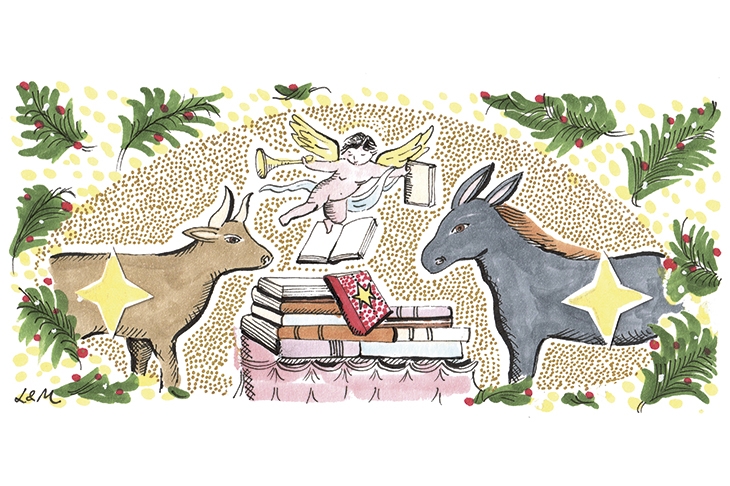
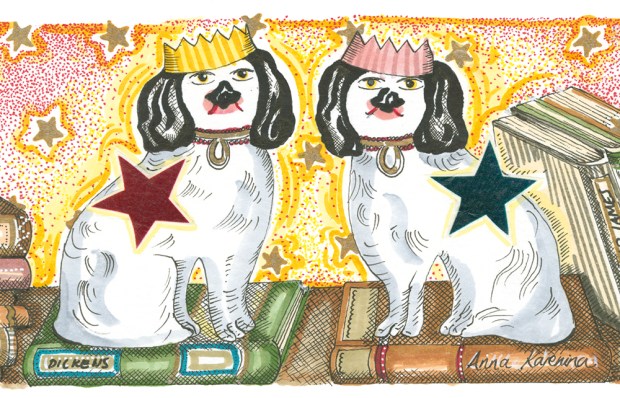
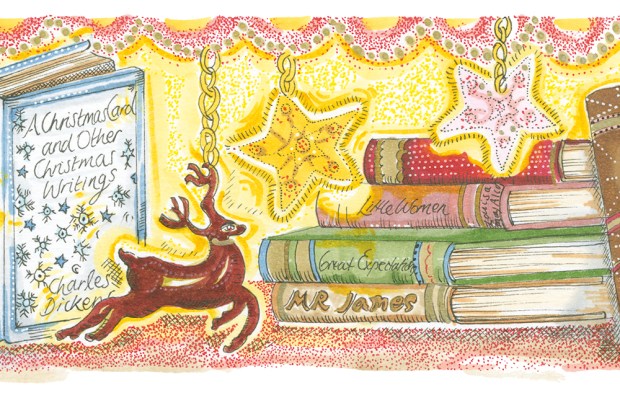
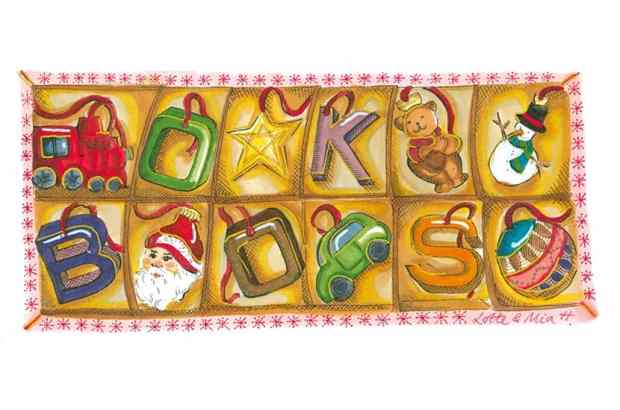
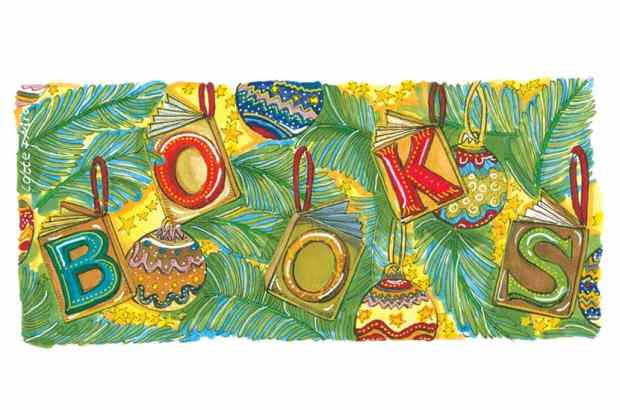
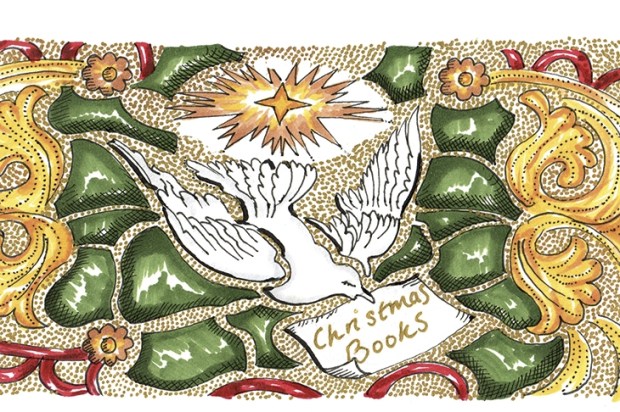
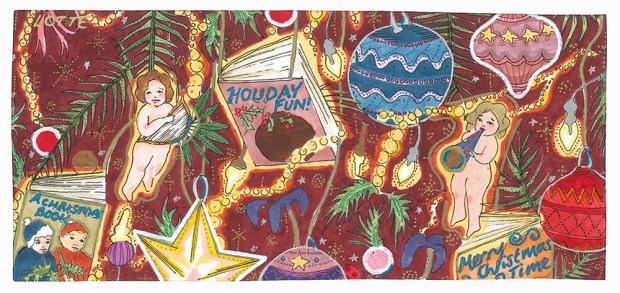






Comments
Don't miss out
Join the conversation with other Spectator Australia readers. Subscribe to leave a comment.
SUBSCRIBEAlready a subscriber? Log in